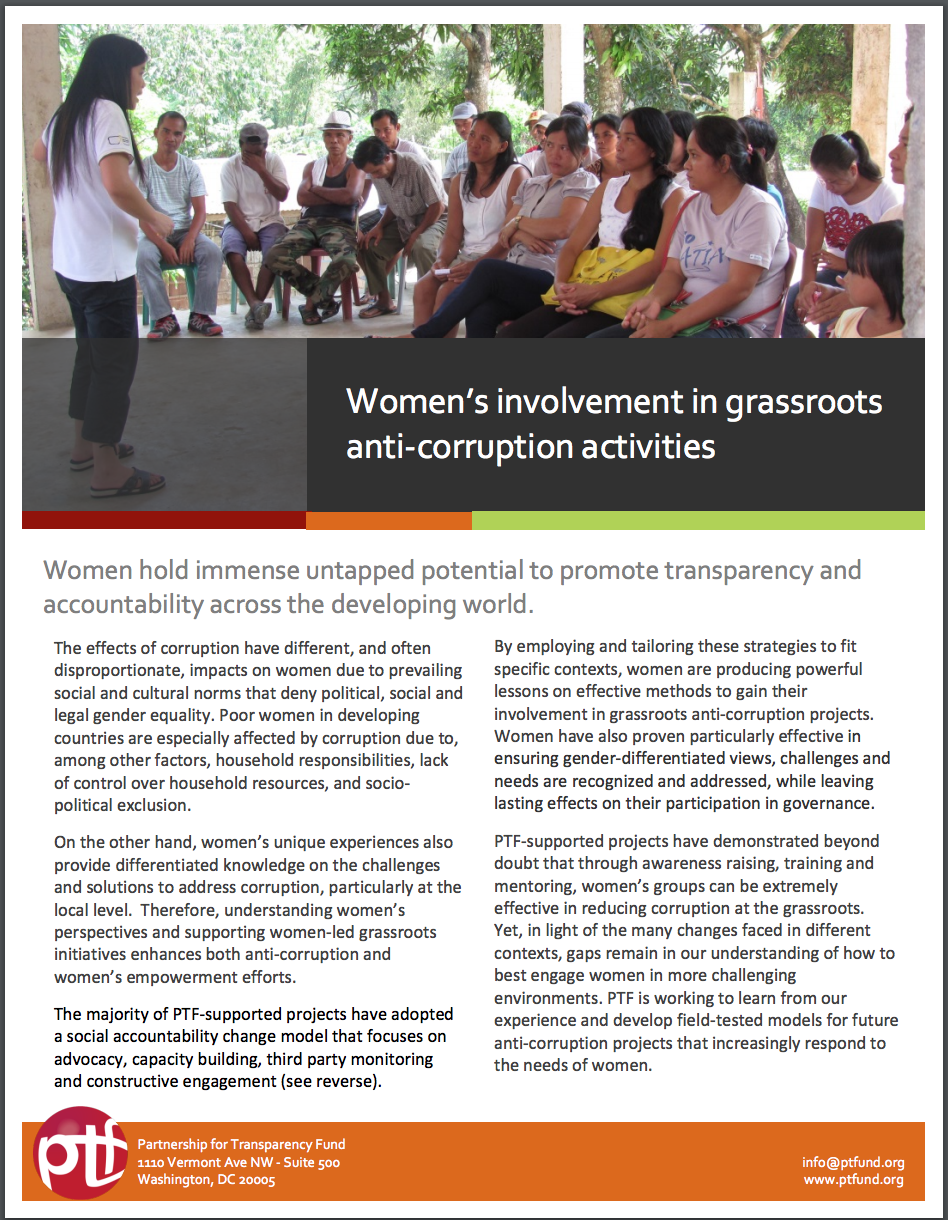The Conditional Cash Transfer Program (CCTP) or Pantawid Pamilyang Pilipino Program (4Ps) has become the largest and core social assistance program in the Philippines. The program is one of the responses of the Philippine government to the challenge of meeting the Millennium Development Goals (MDGs), namely: 1) eradicating extreme poverty and hunger; 2) achieving …
Report of the ‘Social Audit of Performance of Members of Parliament in Odisha’ Released by YSD
Youth for Social Development (YSD) is a PTF partner with a commitment to improve accountable governance, bring transparency in utilization of public funds and ensure its efficient and equitable utilization of tax payer’s money and also to monitor the performance of the elected representatives. The organization has recently released a ‘Social Audit of Performance …
Women’s Involvement in Grassroots Anti Corruption Activities
The effects of corruption have different, and often disproportionate, impacts on women due to prevailing social and cultural norms that deny political, social and legal gender equality. Poor women in developing countries are especially affected by corruption due to, among other factors, household responsibilities, lack of control over household resources, and socio …
Conditional Cash Transfer Program Watch in the Philippines
The Conditional Cash Transfer Program (CCTP) or Pantawid Pamilyang Pilipino Program (4Ps) has become the largest and core social assistance program in the Philippines. The program is one of the responses of the Philippine government to the challenge of meeting the Millennium Development Goals (MDGs) …
PTF Celebrates International Women’s Day
After almost 15 years of working with over 100 CSOs in more than 50 countries, time and time again PTF-supported projects have demonstrated the power of women’s perspectives, knowledge and leadership in generating better designed anti-corruption initiatives with wider impact. As primary caretakers of their households and communities, poor women in developing countries experience corruption in seemingly innocuous daily transactions such as receiving government disbursed medicines, sending your children to school, or even driving are routinely upended and many times stifled by the solicitation of a bribe. PTF is working to reverse the negative gender impacts of small-scale corruption by supporting CSOs with financial resources and expert support to combat it. We’ve trained women around the world to make them aware of their rights and develop their sense of agency, enabling them to obtain ration cards, jobs and other basic entitlements. Many of our CSO partners are led by women – the real heroins to be celebrated today. These dedicated women are crucial, because their perspectives, knowledge and leadership vastly improve the results of anti-corruption initiatives. These champions are rising above their personal interest and inspiring countless others to do the same. Thank you. Click here to read an article focusing on the role of women in two PTF-supported projects in Cameroon and India.
Women’s Involvement in Grassroots Anti-Corruption Interventions
Corruption affects everyone, but women in developing countries often suffer the most. All too often, women experience extortion and corruption at the hands of low-level public officials when it comes to the provision of public services. In many societies women do not enjoy the same rights and privileges as men, reducing their ability to counter the extortion that they often confront on a daily basis.
Independent Evaluations of 116 Projects Stress the Value of Partnership for Transparency Fund’s Pioneering Approaches
John Clark, an international development consultant, former civil society activist and adviser to former UN Secretary-General Kofi Annan, was commissioned by the UK’s Department for International Development (DFID), and by the World Bank to evaluate scores of PTF supported projects. UK Aid and the Bank were the …


